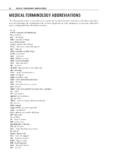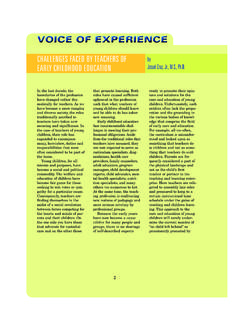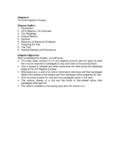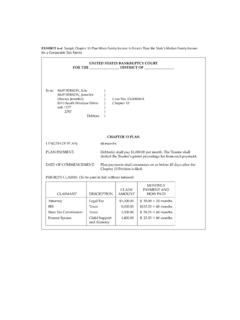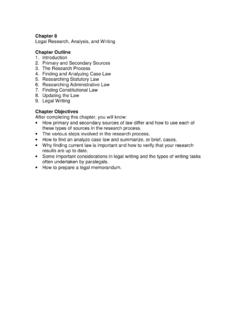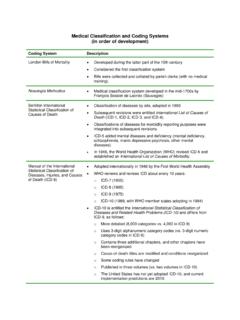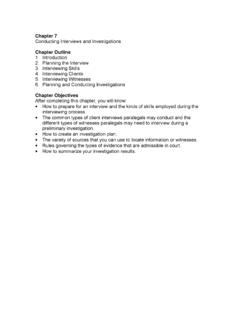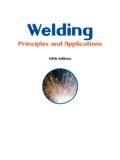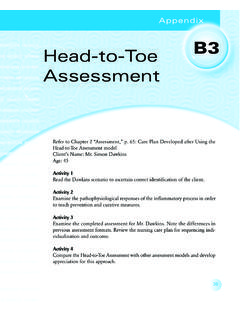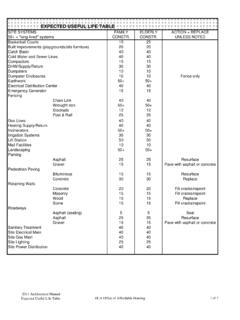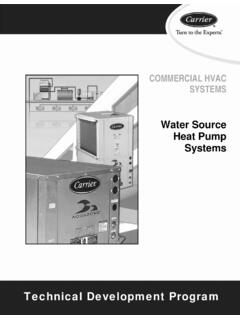Transcription of Residential Plumbing Standards Volume I
1 Residential Plumbing Skill Standards Page 1 of 35 Residential Plumbing Standards Volume I Home Builders Institute Residential Plumbing Skill Standards Page 2 of 35 An Overview of HBI Framework for Skill Standards We are pleased to present the fourth in a series of National Skill Standards for the Residential construction industry. The goal of this project is to establish national Standards for the Residential construction industry that reflect industry skill requirements.
2 The Standards will provide a basis for the certification and training of workers as well as objective benchmarks for employee selection and training needs. In addition, educators will find the Standards useful for designing curricula and evaluating individual training outcomes. These Standards by themselves do not represent a model training program. Rather, these Standards are designed to be a source in developing training programs and curricula and evaluating outcomes of Residential Plumbing training program outcomes.
3 Residential Plumbing Standards are designed for trainees entering the second year of training and journey level plumbers. Standards are developed and validated for the following nine Plumbing specialties: Public Water and Sewer Connections, Private Water and Sewer Connections, Lift Stations and Sewage Systems, Water Quality and Filtration Systems, Solar Systems, hydronic Heating Systems and Boilers, Gas Piping, Backflow Protection, and Irrigation Protection. Thirteen (13) critical work functions or duty areas are identified.
4 Critical work functions describe the major tasks and content areas of work within a specialty. Key activities or major tasks and knowledge involved in completing critical work functions are also provided. Residential Plumbing Skill Standards Page 3 of 35 Performance Indicators, or skill Standards , which help determine when key activities are being performed, are referenced to critical work functions. In addition, applied academic skills required to perform key activities are provided. These include mathematics, communications, and applied science academic skills.
5 Safety requirements are also linked to key activities. How the Standards Were Developed Committees of subject matter experts (SMEs) representing Residential plumbers, small and medium size Plumbing contractors, instructors, trainers and other experts in the field from different parts of the nation were used to establish and validate the Standards . The final list of (13) thirteen critical work functions cutting across nine Plumbing specialties reflects and accommodates regional differences.
6 The project included the formation of a committee of National Association of Home Builders (NAHB) leaders in the field of Plumbing . In addition, the author and editor of Delmar s Plumbing text (Thompson Learning Company) were included in this committee. These leaders represented the following regions: Northeast, Northwest, Southwest, Southeast, Mid-Atlantic and Gulf Coast. A preliminary list of critical work functions and activities performed by Residential plumbers was developed and organized into duty areas.
7 Sources included industry texts and curricula, as well as association reference. An initial committee of nine SMEs edited, reviewed and rated critical work functions, key activities and applied academic skills. The committee also reviewed and referenced applied academic skills, safety requirements and tools Residential Plumbing Skill Standards Page 4 of 35 required for each of these functions and activities. A second group of eight SMEs cross-validated the original list and developed and approved performance Standards for critical work functions and key activities.
8 Residential Plumbing Specialties Subject Matter Experts (SMEs) divided the broad Plumbing occupational category into nine specialties. This reflects the trends towards specialization in the Residential home building industry. The table below shows the percent of all Plumbing activities performed by each specialty. A total 92 activities were identified and rated by the committees. Table 1. What percent of Plumbing activities are performed by each specialty? Public Water/Sewer Connections 84% Private Water/Sewer Connections 83% Solar Systems 80% Backflow Protection Systems 74% Lift Stations & Sewage Systems 65% hydronic Heating Systems 65% Gas Piping 65% Irrigation Systems 54% Water Quality & Filtration Systems 45% Table 1 illustrates core of occupational activities common to many Plumbing specialties.
9 For example, through training in heat Pumps, trainees should gain a broad based to work in other specialties. Residential Plumbing Skill Standards Page 5 of 35 How Standards are Organized Plumbing Standards are organized into the follow broad categories: Applied Academic Skills; Basic Occupational Skills; and Specific Occupational Skills. Performance indicators or skill Standards have been developed for each key activity or major tasks and knowledge required for completing critical work functions.
10 Applied Academic Skills include Basic Plumbing Theory, Mathematics, Communications and Science Skills that are fundamental to Plumbing trainers and journey level workers. Basic Occupational Skills include Safety, Tools and Equipment, as well as Plumbing materials, joining and connecting pipe and using drawings and plans. Plumbing Occupational Skills are organized into the following critical work functions skill categories: (1) Install Drainage, Waste & Vent Systems (DWV), (2) Install Water Supply & Distribution Systems, (3) Install Fixtures, Appliances and Equipment, (4) Install Domestic Water Heaters, (5) Install Boilers, (6) hydronic heat , and (7) Troubleshoot, Maintain & Repair The percent of all trainee and journey level plumbers who perform tasks and key activities, and importance of these tasks are displayed in Appendix A.

